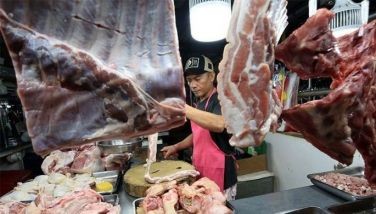Seaoil ramps up food security project
MANILA, Philippines — Seaoil Philippines Inc. (SFI) is stepping up its food security project through its corporate responsibility arm Seaoil Foundation Inc., a timely undertaking amid the looming global food crisis.
The World Bank, the World Trade Organization, the Food and Agriculture Organization (FAO) of the United Nations and the World Food Program (WFP) were similarly warning of “acute food insecurity” due to overlapping crises such as the lingering effects of COVID-19, extreme weather conditions, economic shocks, conflict, the rising cost of fuel and energy, among others.
Originally established in 2017 to promote agri-enterprise leadership program in areas where it is present, SFI’s Tugon sa Gutom program has evolved to securing food security at the household level.
“What we did was look into the program and using the United Nations (UN) Food and Agriculture Organization (FAO) framework on food security as basis for our analysis, we came to realize that we should be more directing our interventions at the household level,” SFI executive director Ramon Derige said in an interview.
Now, Tugon sa Gutom’s main objective is to engage communities, especially farmers and vulnerable families, to increase access to safe, nutritious, and sufficient food.
“The foundation implemented its program that would help address food insecurity, availability of food at all times. But we want to emphasize the availability of food at the household level. This is a very important strategic framework for us,” Derige said.
Through the family farms, households produce mostly pinakbet vegetables, and pechay.
“It is very strategic for the foundation to implement Tugon sa Gutom as its way of contributing to the issue of malnutrition, food insecurity and hunger,” Derige said.
SFI piloted the program in Brgy. Calongay in Pilar, Sorsogon from February to August 2021, with 23 families participating in the training and implementation of their own family farms.
Throughout the six-month pilot run, the families were able to gain a total of P2,882.17 savings and income from their harvest.
“Results of the pilot were really good. They eat 80 percent of their harvest while the 20 percent are sold. The food security status improved,” Derige said.
With the success of the pilot, SFI expanded the program in General Santos and Alabel, Sarangani.
“For 2021, we were just focusing on Pilar, Sorsogon, Gensan and Alabel, Sarangani. Now we have expansion in these three areas, and we are adding up new areas, like Maasim in Sarangani and Bangar in La Union,” Derige said.
For this year, the company budgeted P7.9 million – a substantial increase from just P1.7 million in 2020 and P1.3 million in 2021 – as it increased the number of its target beneficiaries under the program.
“It’s really an investment on the part of Seaoil Philippines as its contribution to community development,” Derige said. “We already achieved 493 households in 2021 and we are targeting 725 households or families, so that would be 1,218.”
Expanding outside Seaoil’s scope
While the original scope only covered areas where Seaoil’s depots are located, SFI is also looking to implement the Tugon sa Gutom program in Pasig City at the request of the LGU.
“Since we are in Pasig, we had to attend to the request of LGU to help adopt the program in the city. We are pilot testing in one urban poor community, that’s about 100 families,” Derige said.
In April, SFI presented the program to the Pasig City LGU upon the latter’s request.
The meeting focused on exploring alignments with SFI’s Family Farm Program and Office of the Mayor - Civil Society Organizations (CSO) Desk’s Urban Farming Initiative.
The initiative aims to help homeowners’ associations (HOAs) in establishing and sustaining their home-based urban farms and communal gardens to reduce or prevent malnutrition cases in their areas and enhance the capacity of urban poor families to food production at home.
SFI was requested to provide them with technical assistance in adapting SFI’s Tugon sa Gutom Model and integrating it in their urban farming initiatives.
Last month, SFI conducted community visit and assessment in the Sandoval Compound in Barangay Pinagbuhatan together with the Pasig LGU CSO Desk and Samahang Nagkakaisa Taga-Riverside (SNTR) - an existing HOA of 500 members.
SFI said inception meeting with the Barangay LGU in Pinagbuhatan and formalization of partnership with the City LGU will be pursued this month.
The foundation also initiated partnership talks with the UN World Food Program for a possible partnership to implement the program in Marawi.
“For Marawi, we may work with them but limited to technical cooperation. We already got the commitment of the Assisi Development Foundation for the feeding and Jollibee foundation is open to the agro-enterprise program,” Derige said.
Forging partnerships
To successfully implement this program, SFI stressed the importance of forging partnerships with local government units (LGUs) and non-government organizations (NGOs).
“What we offer in the foundation in the Tugon Sa Gutom program is a collective impact initiative. Anyone interested to come in and join us, and contribute to the overall effort. There’s a whole of intervention areas,” Derige said.
He said the program does not only cover food production, but also marketing, training, microfinancing etc.
“Seaoil cannot provide everything that’s why we work with LGUs. This is a strategic implementation strategy…we align our program with the policies and programs of LGUs so the resources and fund of the LGUs can be placed in the program. And we work with other NGOs, we have partners,” Derige said.
All its partner LGUs, under the leadership and guidance of the local chief executives, provided the necessary personnel and resources needed in the joint implementation of the Tugon Sa Gutom program.
One of its current NGO partners is the Assisi Development Foundation, which handles feeding program needed in the area.
It is also working with Mahintana Foundation—formerly the corporate foundation of DOLE Philippines, which provides technical assistance in the development, test run and roll out of the open data kit (ODK) tool for baselining and monitoring.
“They agreed to work with us with the government for the veggie dehydrating facility. We have a syndicated program. We’ll deal with production, they will cover in terms of managing, processing, finance and management,” Derige said.
To further expand the program, SFI is negotiating with more NGOs and foundations such as the Ramon Aboitiz Foundation for microfinancing and the Jollibee Foundation for agro-entrepreneurship program.
“It is a big incentive for households that, aside from the food, they can have additional supplementary income. If we can graduate them without leaving the food access program, they can go into to commercial level. That’s what we are willing to direct the program with the partners,” Derige said.
- Latest
- Trending































